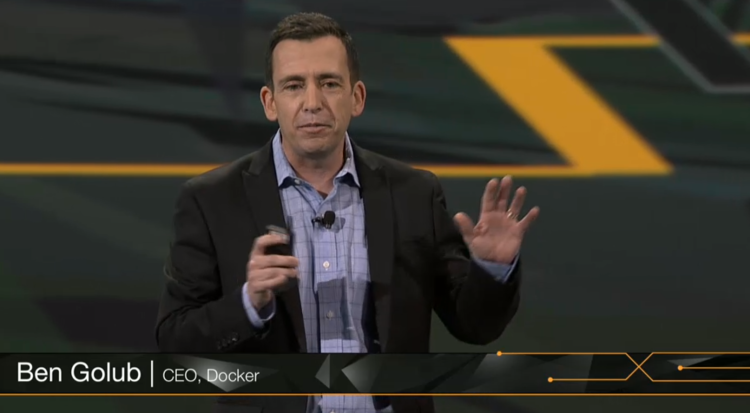With the release of its EC2 Container Service today, Amazon Web Services caught up with public-cloud competitors like Google and Microsoft in deeply supporting the deployment and control of applications packaged up in containers, a trendy alternative to longstanding virtual-machine technology.
It’s critical for Amazon to be able to articulate its ability to run applications in containers, which simplify the process of porting apps from one server environment to another. But today’s news also translates into a huge win for Docker, the startup that started the application container revolution in the first place. Docker’s chief executive, Ben Golub, even got to crash the Amazon party today in a keynote appearance following the announcement of the EC2 Container Service.
“We’re absolutely excited to have the market-share leader be focused on building a service for Docker apps for their customers,” said David Messina, Docker’s vice president of enterprise marketing, in an interview with VentureBeat. “I mean, that’s fantastic.”
From a big-picture standpoint, though, it was a predictable move if Amazon wished to retain its credibility among startups that like to write and deliver software with the latest, most helpful tools.
And from the looks of the market, the move had to come, too.
Just last week, Google announced the Google Container Engine, a hosted version of its Kubernetes cluster-management tool running on the Google Cloud Platform.
And last month, Microsoft, which has pledged support for Kubernetes, came out and announced its intent to allow for Docker container usage on servers running Windows, meaning that Microsoft support will go beyond the Azure cloud and extend into companies’ own data centers.
Cloud industry watchers generally perceive Microsoft and Google to be Amazon’s closest competitors, but without a doubt, several other cloud providers have articulated a vision to be the best possible place to run Dockerized applications.
Rackspace and VMware have both come forth with plans to support Docker containers. Joyent, already an advocate of containerization, might well work with Docker in the future, too.
And IBM and Red Hat, among others, have aligned with the Google-led Kubernetes initiative.
One lingering thought on the mind of Alex Polvi, founder and chief executive of CoreOS, a startup pushing an operating system that runs applications in Docker containers, is where exactly all of this leaves Docker itself.
“Does it mean Docker is a layer on top of the cloud provider?” Polvi asked in an interview with VentureBeat. “Does it mean cloud providers keep Docker to be a package format and nothing more? It’s an interesting little tension.”
But never mind that. Today we know with more certainty than ever that even Amazon can agree with its cloud providers that containers make sense as a deployment model for developers’ applications. Never mind that Amazon is eschewing the open-source Kubernetes project and offering a service independent of all that, to deploy containers in EC2 instances on Amazon.
The bigger point is the secular industry-wide acceptance of containers. And Messina believes that acceptance will only grow.
“Clearly there’s a trend line here of differentiated services from the cloud providers,” he said. “Should we expect more of that? The answer, I believe, is absolutely yes.”


